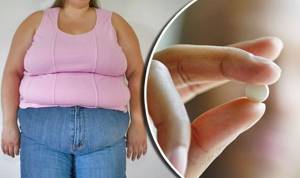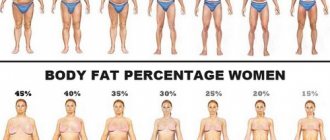The peptide hormone prolactin (mammotropin) was isolated in the human body almost a hundred years ago (in 1928). But during all this time, scientists have not been able to fully study the features of its functioning. They found out that the amount of milk during breastfeeding depends on it and that it is produced in the anterior part of the pituitary gland. But why it is found in the heart, lungs, kidneys, liver, spleen, pancreas, uterus, ovaries, muscles and what effect it has on them - no one can say for sure.
Recently, doctors are increasingly saying that prolactin and excess weight are interconnected. If one rises, the second immediately creeps up and, accordingly, vice versa. How to use it for weight loss? Let's find out.
About the hormone
The main purpose of prolactin in the female body is to produce breast milk. Its norm in men is no higher than 7 ng/ml, in women - 12 ng/ml. However, during pregnancy this figure increases up to 300 ng/ml and remains at this level throughout the entire period of breastfeeding.
If a woman is not pregnant or breastfeeding, and mammotropin in her body exceeds 20 ng/ml, hyperprolactinemia is diagnosed. In men it is less common, but it also happens. For them, the risk point is considered to be 15 ng/ml. As practice shows and research confirms, the disease is always accompanied by an increase in body weight, which suggests a connection between this hormone and excess weight.
If prolactin is normal, it has a positive effect on the body:
- reduces pain sensitivity;
- strengthens the immune system;
- is an integral part of the nerve fiber sheath;
- stimulates the growth of new blood vessels;
- participates in achieving orgasm.
The positive effect of mammotropin during breastfeeding is known to everyone: the body begins to produce milk in such quantities that the baby has enough. In addition, it prevents a new pregnancy during this period, as it inhibits the menstrual cycle.
However, exceeding the norm of this hormone is fraught with serious consequences:
- menstrual irregularities;
- infertility;
- heart diseases;
- anorgasmia;
- frigidity, lack of libido;
- macromastia, cysts, adenomas, breast cancer;
- galactorrhea;
- diabetes mellitus (the fact has not yet been scientifically confirmed, so remains questionable);
- atherosclerosis;
- mental pathologies.
True, the risk of developing such serious diseases is quite low. But excess weight is always observed in such situations. And equally in both men and women.
Related article: How to lose weight with diabetes.
This is interesting. Prolactin is considered one of the most poorly studied hormones in the human body.
How to lose weight while breastfeeding
During gestation, a woman’s body undergoes restructuring, her appetite increases and cellulite appears on her legs and thighs. After childbirth during breastfeeding, restoring normal weight is difficult to achieve, since diet is contraindicated at this time.
But there are a number of ways that help remove extra pounds even during this period. Let us consider in more detail the question of how to lose weight during breastfeeding without harming the baby.
Features of the female body during this period
As during pregnancy, during lactation a woman’s body works primarily for the benefit of the child. The hormonal levels are changed and are not completely restored until the baby is completely weaned from the breast. In addition, after giving birth it is difficult to think about the state of your body, since a baby requires maximum investment of time and effort.
To ensure constant milk production, a nursing mother produces prolactin. Normally, it remains at a high level for the first six months after birth. Its deficiency leads to disruption of lactation and transfer of the child to artificial feeding, which is very harmful to his immunity and development.
But prolactin and excess weight go hand in hand, since this hormone increases appetite and slows down the metabolism of fats in the body.
Other causes of weight gain
To understand how to lose weight while breastfeeding, you need to figure out what other reasons for weight gain exist during this period. Experts say that in addition to an increase in prolactin, obesity and the appearance of cellulite on the legs and thighs occur during breastfeeding as a result of the following reasons:
- The habit of eating rarely and a lot. Lack of energy and time leads to the fact that a woman does not have time to eat on time and sits down to eat only before bed. This leads to gaining additional kilograms.
- Depression . Additional worries associated with the birth of a baby, especially if they are not shared by close people, lead to disruption of the psycho-emotional sphere. Often, nursing mothers, due to an increase in appetite, experience problems and stress.
- Decreased physical activity . Walking at first does not take much time; often the woman simply goes out onto the street or balcony and sits there while the child breathes air. But I don’t have enough time and energy to do exercises.
- Lack of sleep. Gaining extra pounds and deposition of fat on the thighs and legs occurs due to chronic lack of sleep. The substance responsible for the feeling of fullness (ghrelin) is produced during sleep. And when the child does not sleep well and often wakes up, the mother also lacks rest and eats more than necessary. For this reason, weight gain occurs.
- Decreased adrenal function . A constant state of stress leads to the fact that these internal secretion organs sharply reduce their activity during breastfeeding. In this case, the young mother develops a feeling of lethargy and fatigue, and the rate of metabolic processes decreases.
What to do to lose weight
Breastfeeding requires a woman to eat properly and nutritiously, so that through milk the baby can receive the necessary substances for growth and development.
Nutritional Features
Refusal to eat can lead to the disappearance of breast milk and even greater fatigue. And the child will experience severe hunger, get sick and physically lag behind his peers. But there is a way out in this case; for this you need to adhere to simple rules of eating:
- limit animal fats and sweet dishes and baked goods on the menu;
- eat a lot of vegetables and fruits to ensure the supply of necessary vitamins and microelements;
- eat often, it is advisable to constantly snack in small portions every 3-4 hours;
- to drink a lot of water.
It is important ! Rare meals, even in small quantities, reduce metabolism. This happens due to the fact that, receiving few calories and useful components, the body begins to store fat and weight, despite food restrictions, increases.
Physical activity
It is also important to gradually increase physical activity. In this case, we are not talking about washing, cleaning and other household work. You can take slow walks in the air, lengthening the route each time. This is useful not only for the child, at this time the mother also takes a break from the everyday hustle and bustle and restores the nervous system.
If possible, it is recommended to start visiting the gym, but it is recommended to start no earlier than six weeks after birth in the absence of complications. A great option is going to the pool or going to a fitness class.
At first, the loads should be minimal, and if tolerated normally, they can be increased, but very carefully and gradually.
As a last resort, you should remember the exercises from physical education classes. Since getting rid of the belly after childbirth is the main task, pumping the press will help with this. It is best to divide it into three approaches and increase it to 40 times with each complex.
After a short time, the result will be noticeable. In addition, your legs and thighs will begin to lose weight, and simultaneous walking will help you remove cellulite from your lower extremities.
What is not recommended to do
During feeding you should not:
- go on a strict diet or fast;
- eating for two at once will not help improve the quality of milk, but will lead to obesity;
- start abruptly doing exercises and overloading yourself;
- practice exercises that are accompanied by the release of fluid (running, aerobics, step);
- take dietary supplements and weight loss medications without consulting a doctor;
- perform movements without wearing a bra that supports (but does not press!) the chest.
Other weight loss methods
If the consumption of excess food occurs as a result of the development of depression after childbirth, then in this case physical exercise, walks in the fresh air, and a sufficient number of hours of good sleep will also help.
If the deterioration in mood is protracted and pathological, then in this case you need to contact a psychologist or psychotherapist. However, taking medications will require switching to artificial feeding.
Many chemicals (antidepressants, tranquilizers) have the ability to pass into breast milk and can harm the baby.
Conclusion
The postpartum period occurs differently in women. But in many cases, additional weight gain occurs and cellulite develops on the legs, thighs and buttocks. Stretched abdominal muscles also require attention. The best way out in this situation is to normalize nutrition and increase physical activity.
Nutritionist with 3 years of experience.
Education: Diploma in General Medicine, Tyumen State Medical Academy (2004)
Specialization : General nutrition consultation;
Extensive experience in:
- selection of diet for pregnant women;
- selection of nutrition for exhaustion (dystrophy);
- weight correction;
- selection of nutrition for obesity;
- selection of therapeutic nutrition;
Source: https://VashyNogi.com/krasota/pohudenie/metody/pohudet-pri-kormlenii-rebenka-grudyu.html
Link to excess weight

These scientific debates are reminiscent of the age-old chicken and egg mystery. Some believe that the first is the cause of the second, others - the consequence. The exact mechanism of their interaction remains to be determined, but it can already be said unequivocally that they are closely related to each other. And if the BMI exceeds 30, and the analysis showed that the amount of LTG (lactotropic hormone) in the body is off the charts, one thing is clear - it must be urgently reduced. As practice shows, if certain conditions are met, this also entails a decrease in body weight.
Some scientists believe that it is prolactin that prevents weight loss during breastfeeding. However, this point of view has yet to be proven, since only in 5% of cases the hormone prevents weight loss. Other women, following a certain diet and sufficient physical activity, manage to bring their figure back to normal during the first year after childbirth.
Related article: How to lose weight while breastfeeding.
Hyperprolactinemia slows down metabolism and increases appetite, which leads to excess weight gain. Negative changes occur in lipid metabolism, cholesterol and lipoprotein levels increase. This is how scientists explain obesity in 60% of patients with this diagnosis, and it is usually accompanied by insulin resistance. This is caused by prolactin stimulation of pancreatic cells. There is an opinion that this is also associated with an increased risk of developing diabetes, but there is no exact data on this.
Interesting fact. Prolactin consists of 199 amino acids.
Which hormone is to blame for obesity? The role of prolactin in excess weight gain.

Recently, doctors are increasingly talking about the relationship between obesity and increased levels of prolactin, a hormone produced by the cells of the anterior pituitary gland. We already know that all troubles come from the head. But how exactly do the features of the brain affect the increase in body size? Is it possible to somehow control these processes from the outside? With this and other questions, the magazine “Pro Health” turned to Irina KUZNETSOVA, Doctor of Medical Sciences, gynecologist-endocrinologist, professor of the Department of Obstetrics and Gynecology of the Russian Medical Academy of Postgraduate Education .
– What is this mysterious prolactin and what is its role in the body?
– Oh, this is a completely mysterious hormone. He is the only one who intervenes in all processes, but his role for our health, meanwhile, is not fully understood. Its absolute importance for the formation of lactation is known; without prolactin, a woman cannot produce milk. But what he does while participating in other “scenarios” of our lives is not yet clear to scientists. We know that prolactin can affect the reproductive system, the bone system, and metabolism; it is also one of the adaptogens - it is released into the blood in response to stress and helps the body withstand excess physical or mental stress. But what metabolic processes does it trigger? For now, we can only state that prolactin increases for some reasons known only to it. Although the regulators of prolactin levels in the brain are well known. This is dopamine, which controls (reduces) prolactin production. The second regulator is thyrotropin-releasing hormone, a hormone that increases the production of thyroid-stimulating hormone (TSH) and, for company, prolactin. That is why, with hypofunction of the thyroid gland, prolactin can increase simultaneously with TSH. Prolactin levels also increase during sex, which is why doctors always warn patients not to have sexual intercourse before taking tests. But what role does he play in this? No one has explored it yet...
– Perhaps it, as an adaptogen, prevents us from dying of love...
Causes of hyperprolactinemia
If you have both excess weight and hyperprolactinemia, you should first find out the cause of the latter. Only after its elimination can you begin losing weight, otherwise it will be useless.
Physiological reasons:
- deep dream;
- intense physical activity;
- lactation;
- pregnancy;
- age-related changes in the body after 40 years;
- menopause;
- taking certain medications (hormonal, antipsychotic, antihistamine, antiemetic);
- sexual intercourse
Pathological reasons:
- galactorrhea;
- amenorrhea;
- gynecological pathologies;
- dysfunction of parts of the brain;
- hypothyroidism;
- renal failure;
- cirrhosis of the liver;
- autoimmune diseases;
- vitamin B6 deficiency;
- stress;
- mammary gland injuries;
- frequent abortions, intrauterine device.
Elevated prolactin levels due to physiology are temporary. In this case, there is no need to sound the alarm and immediately stop breastfeeding or deny your partner sex just to get rid of excess weight. You need to wait out these surges and everything will return to normal on its own.
But for pathological reasons, you will have to go to the doctor and get treatment, otherwise no diet, even the most effective one, will help you lose weight.
Did you know that... increased mammotropin carries not only harm, but also benefit? For example, it can cure multiple sclerosis.
Menopause and related problems. Should hormone therapy be used?
With the onset of menopause, a woman experiences dramatic changes - both in her sex life and in her hormonal levels. This manifests itself in everything from health characteristics to excess weight:
- Firstly, from this time on, the size of the uterus decreases. Don’t let this scare you, since this process is absolutely normal and physiologically determined.
- Secondly, the protection of the vagina from the penetration of bacteria is significantly reduced. From now on, it becomes very easy to get any inflammatory process.
Therefore, even while continuing to be sexually active, a woman should be more attentive to hygiene – both her own and her partner’s.
Our sensitivity to microorganisms at this time can even cause cancer. The basis for a malignant tumor can be any microbe or inflammatory process. Under their active and negative influence, organ cells often begin to change their shape, and their functions are impaired.
Another reason may be excessive production of the hormone ergosterone, which contributes to the development of endometriosis. As a result, due to fluid retention, the woman develops edema and notices swollen thighs. It is clear that endometriosis is caused in the same way by excess weight, which is so difficult for us to get rid of on our own.
Symptoms

Elevated prolactin levels are determined using a special hormone test. But how to detect the need to go and take it? The body itself will give signals in the form of certain symptoms.
General symptoms:
- overweight (BMI over 30);
- osteoporosis diagnosed before age 35;
- acquired vision problems;
- headache;
- autonomic dysfunction syndrome;
- hair loss;
- increased appetite;
- psychoemotional disorders.
For men:
- decreased libido;
- impotence;
- infertility.
Among women:
- menstrual irregularities, galactorrhea, amenorrhea;
- infertility;
- diseases of the mammary glands.
Adolescents experience delayed sexual development.
In advanced cases, hyperprolactinemia is accompanied by a tumor of the pituitary gland, which is called prolactinoma. It is this that causes vision problems and headaches.
You should know it. A test for prolactin levels is taken on an empty stomach a couple of hours after waking up. 3-4 days before it you will have to eliminate smoking, sweets and physical activity.
Facts about PMS. What causes it and how to deal with its consequences?
This is all explained purely by our physiological characteristics, or more precisely, by female hormonal levels.
Until this moment occurs, a woman’s body naturally strives for fertilization, which is accompanied by the production of the hormone ergosterone. It increases arousal and sex drive, making us actively seek a partner.
At this time, we are active and cheerful, mobile and have a positive attitude towards everyone around us. We are in search!
But now the egg has matured, and another hormone called prolactin comes into play. The hormone prolactin during pregnancy is designed to retain all substances to ensure the most complete development of the fetus.
Treatment
If the patient’s examination confirms high prolactin, and the excess weight is dictated precisely by hormonal disorders, a course of treatment is selected. Prolactinoma is usually removed surgically. In its absence, drugs are prescribed that can reduce LTG levels. These include:
- bromocriptine (begin treatment with 1.25 mg orally at bedtime with meals, gradually increasing the dosage);
- pergolide (0.025 mg at bedtime);
- cabergoline (0.25 mg twice a week);
- quinagolide (0.5 mg once daily);
- dostinex;
- norprolac;
- tergurid;
- lisuride;
- dihydroergocriptine;
- metergoline.
Dosages in most cases are determined by the doctor in accordance with the individual characteristics of the patient. Sometimes medication must be combined with radiation therapy. After a full course of treatment, both prolactin levels and weight decrease.
The many faces of prolactin. It has many names: mammotropin, LTG, lacto-, luteotropic, lactogenic, mammotropic hormone.
What to do after menopause?
I always tell women how important it is to realize their role in this life. Our purpose is not limited to just having children.
Perhaps many women used to think so, but this was more likely due to the low level of education and poor living conditions. Therefore, it was believed that a woman was obliged to give birth to children and raise them. And many died young - alas, this was considered the norm. She gave birth to children, which means she fulfilled her mission.
Therefore, today's ladies look great even after two or three births, and many of them are puzzled by how to lose weight after menopause. Because they want to remain attractive and continue to lead an active life - drive a car, meet friends in a cafe, go out. Many continue to work, and no one is surprised by this today.
All this once again proves how important it is to redirect your sexual energy in a different direction, to find something that will completely change your interests.
If you have gained weight during menopause, nutritionists and doctors will tell you how to lose weight.
Additional recommendations

Despite all the mystery of this hormone, it is clear that prolactin and weight loss are closely related to each other. If it is elevated and you are overweight, you definitely need to reduce it by any available means.
First, get tested for hormones and undergo the necessary studies. To clarify the diagnosis, the doctor may prescribe:
- X-ray of the skull;
- Ultrasound of the prostate gland in men and the uterus and ovaries in women;
- fundus examination;
- blood and urine tests.
Secondly, follow all the doctor’s recommendations: take prescribed medications and improve your lifestyle. If your main goal is to lose weight, know: without reducing prolactin, it is impossible to get rid of excess weight in such situations. Even if you sit on the strictest diet and spend several hours every day in the gym, nothing will change. On the contrary, it has been proven that increased physical activity increases LTG levels, and fasting further slows down the already disturbed metabolism. Therefore, do not become your own enemies - for successful treatment of hyperprolactinemia and weight loss:
- lead a healthy lifestyle;
- eat right;
- exercise moderately (no more than 3 times a week and no more than 40 minutes a day);
- avoid stress;
- fully treat any emerging diseases;
- Constantly monitor your doctors and undergo a general medical examination once a year.
Some foods, herbs, and pills will help reduce your appetite.
Prolactin is a mysterious hormone, and scientists have yet to make discoveries in this area. Although it is already clear today that it is directly related to excess weight. To lose weight, you will have to normalize its level in the body, otherwise you will not be able to escape from obesity.
The relationship between elevated prolactin levels and excess weight: how to reduce both indicators
The peptide hormone prolactin (mammotropin) was isolated in the human body almost a hundred years ago (in 1928).
But during all this time, scientists have not been able to fully study the features of its functioning. They found out that the amount of milk during breastfeeding depends on it and that it is produced in the anterior part of the pituitary gland. But why it is found in the heart, lungs, kidneys, liver, spleen, pancreas, uterus, ovaries, muscles and what effect it has on them - no one can say for sure. Recently, doctors are increasingly saying that prolactin and excess weight are interconnected. If one rises, the second immediately creeps up and, accordingly, vice versa. How to use it for weight loss? Let's find out.
My weight loss programs (diets and courses) are designed for women of all age categories.
They actively use my works and live full lives.
I remind everyone that the main problem during this period is hidden in our heads. When childbearing time passes, many people feel left out. It seems that life has ended along with the ability to become pregnant. This is far from true.
For young girls, much of our life knowledge is simply unknown due to lack of experience, and our task is to pass it on, to help the younger generation determine the necessary guidelines in life.
From now on, you are an indispensable assistant in the family, an adviser and a keeper of traditions. But this does not in any way prevent you from continuing your own creative searches. What it will be - travel or floriculture, creating your own business or a passion for art - it’s up to you to decide.
There are new opportunities for self-development
In adulthood, many women open up new opportunities. This is what we need to focus on. Previously, something always hindered the implementation of your ideas - small children, work and household responsibilities, elderly parents.
Now you can focus only on your own plans, because the children have grown up and household responsibilities have decreased.
It must be admitted that a woman’s life is greatly influenced by her hormonal levels. In fact, this is something that we cannot completely control due to the physiological nature of the processes.
And the reasons for strange mood swings are often precisely the production of certain hormones. There are other manifestations of hormonal effects that sadden many women. These are excess weight, the appearance of edema, loss of attractiveness of the figure and appearance.











